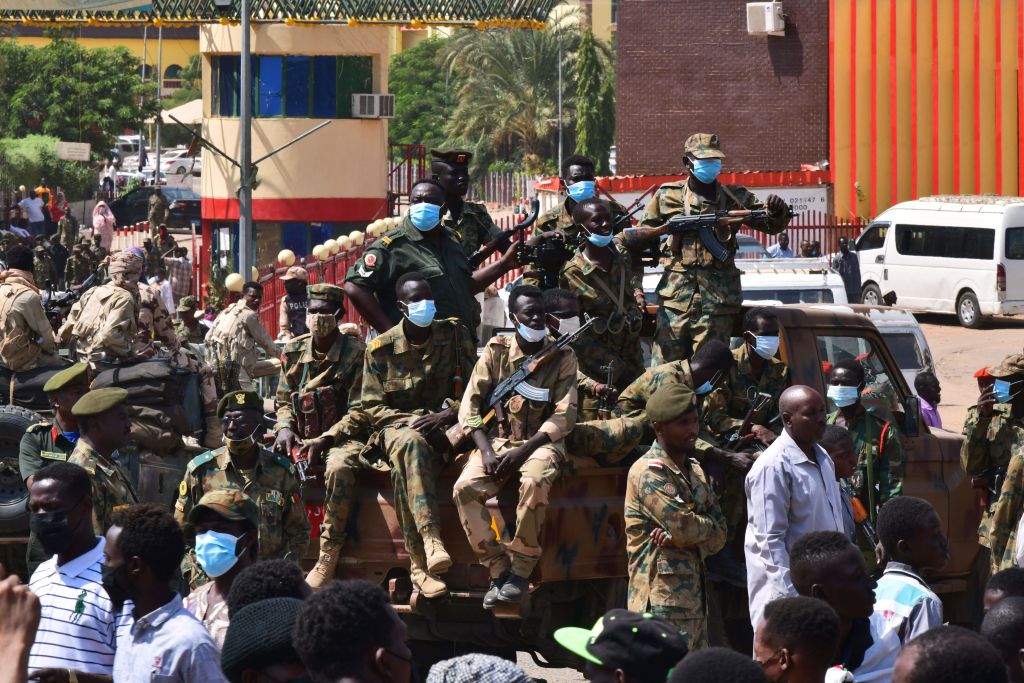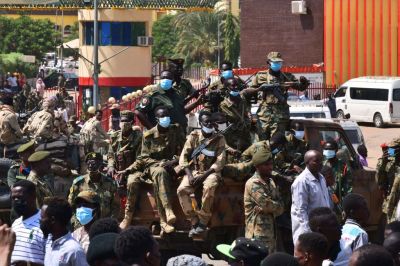Happy Tuesday! And, if you’re a procrastinator, best of luck getting your taxes done this morning!
Quick Hits: Today’s Top Stories
- U.S. Central Command (CENTCOM) announced Monday that a helicopter raid in northeast Syria killed an ISIS leader, Abd-al-Hadi Mahmud al-Haji Ali, who the military believes was responsible for planning attacks in the Middle East and Europe. Two other “armed individuals” were killed in the attack, a CENTCOM spokesman said, and no U.S. personnel were injured.
- The FBI arrested two U.S. citizens on Monday who the Justice Department alleges were operating a Chinese police outpost in New York City’s Chinatown aimed at intimidating Chinese dissidents on behalf of the Chinese Communist Party. They’ve been charged with obstructing justice and conspiring to act as agents of the Chinese government. The DOJ also announced charges against 34 Chinese officials allegedly operating a “troll farm” tasked with harassing opponents of the Chinese government online.
- China last week upheld the death sentence of American Mark Swidan, who has been in Chinese custody since 2012 after his arrest on drug-related charges. The State Department considers Swidan wrongfully detained and condemned the ruling. Republican Sen. Ted Cruz of Texas, Swidan’s home state, called on the Biden administration to use “every tool available” to free Swidan.
- A U.S. warship sailed through the Taiwan Strait on Sunday after China performed live-fire exercises around the island in retaliation for a meeting between Taiwanese President Tsai Ing-wen and House Speaker Kevin McCarthy in California earlier this month. The move took place amid a meeting in Japan of the Group of Seven’s top diplomats, including Secretary of State Antony Blinken, who collectively vowed to stand up against Chinese “coercion” in the vital waterway.
- The State Department on Monday endorsed a $259 million deal to upgrade Turkey’s existing F-16 fighter jet fleet, which would bring the jets up to par with those of other NATO allies and improve their compatibility with other member states’ air forces. The sale—which is separate from Turkey’s bid to purchase new F-16s—will now go to Congress for official approval. President Joe Biden has supported both F-16 deals but has met opposition in Congress.
- U.S. Ambassador to Russia Lynne Tracy visited detained Wall Street Journal reporter Evan Gershkovich on Monday, the first time Russia has allowed embassy officials to see Gershkovich since he was arrested and charged with espionage almost two weeks ago. Tracy said the reporter is “in good health and remains strong” and reiterated calls for his immediate release.
- Germany retired its final three operational nuclear power plants over the weekend, in accordance with a 2002 law requiring the phaseout. The move was delayed by the war in Ukraine, which highlighted Germany’s dependence on Russian natural gas, and the country may now rely more heavily on coal and natural gas—or energy exports from nuclear-reliant neighbors like France—until it can transition fully to renewables.
- 85-year-old Andrew Lester was charged with two felonies Monday after Kansas City, Missouri prosecutors alleged he shot an unarmed black teenager, Ralph Yarl, in the head and arm Thursday night. Yarl, 16, reportedly rang Lester’s doorbell by mistake while trying to pick up his brothers from a friend’s house on the next block. A warrant has been issued for Lester, who was held briefly Thursday night before being released. Yarl, who his family says suffered a cracked skull and a traumatic brain injury, was released from the hospital Monday and received a phone call from President Biden.
- In upstate New York, 65-year-old Kevin Monahan was charged with second-degree murder on Monday after he allegedly shot at a car that mistakenly pulled into his driveway, killing 20-year-old Kaylin Gillis. A group of four friends were in the car, reportedly trying to find the home of another friend.
- Democratic Sen. John Fetterman of Pennsylvania returned to the Senate Monday after being hospitalized in February to receive treatment for clinical depression. Senate Minority Leader Mitch McConnell, 81, also returned to the Senate Monday, his first time back at work since he fell and suffered a concussion at a fundraiser in early March.
Guns Talk in Sudan

Residents of Khartoum, the capital city of Sudan, were shaken Saturday by the sound of fighting as troops exchanged gunfire. Fighter jets scythed low over rooftops and black smoke blotted out swathes of the city as satellites recorded burning government buildings and wrecked airplanes.
The attacks haven’t stopped. “The fighting is going on and we can hear bullets and bombing all around us,” said Islamic Relief’s Sudan Country Director Elsadig Elnour. “Buildings are on fire and smoke fills the sky. People are trapped in their homes and scared about what is going to happen in the coming days. Life is paralyzed, everything is closed, and food supplies are running out.”
Four years after a popular uprising ousted Sudanese dictator Omar al-Bashir and opened the door to democracy, a power struggle between Sudan’s two top military leaders has erupted into fierce fighting in the capital and around the country. Western negotiators had hoped the two would finalize a power-sharing agreement earlier this month and begin returning the country to civilian rule, but the conflict now threatens to escalate into a full-blown civil war.
Army chief Gen. Abdel Fattah al-Burhan commands Sudan’s military, while Mohamed Hamdan “Hemedti” Dagalo runs the Rapid Support Forces (RSF)—a paramilitary group which sprung from the Janjaweed militias that participated in genocide in Darfur and which was later elevated by Bashir in part as coup insurance to counter the power of Sudan’s military. Burhan and Hemedti joined forces to help oust Bashir following widespread protests in 2019 and participated in discussions with a civilian transitional government—before executing a coup in 2021 and cracking down on protests. Both assented to a United Nations-backed framework for restoring civilian rule in December 2022, but they clashed over combining forces.
Western negotiators—including the State Department—focused on pushing through a final version of the UN-backed agreement and may have overlooked the risk of rising tensions. “The State Department briefed Congress just last week on policy options once a political agreement was signed—signaling optimism that a political transition was at hand,” a Republican staffer on the House Foreign Affairs Committee told The Dispatch. “The committee’s understanding of the deterioration in the security situation last week came from non-government contacts.” By Monday afternoon, the staffer said, the State Department hadn’t updated Congress on the situation even as fighting continued into its third day.
A State Department spokesperson told The Dispatch the agency does not comment on its communications with Congress but added that Blinken has spoken with Burhan and Hemedti and is pushing for a 24-hour ceasefire. “For months prior to the violence, the Department was deeply engaged in supporting Sudanese-led negotiations, working closely with civilian parties (and encouraging military leaders) to find solutions to outstanding issues,” the spokesperson said. “We call on all actors to renounce violence, return to negotiations, and take active steps to reduce tensions and ensure the safety of all civilians.”
The military and the RSF have blamed one other for the hostilities, and they both claim control of various strategic locations. The United Nations estimates 180 civilians have been killed in the clashes so far, but that’s likely an undercount. Several hospitals have shut down in the face of raids or shelling, and the World Health Organization reported additional medical facilities were running out of blood transfusion supplies and other essentials. UN officials have urged daily humanitarian ceasefires, but a pause in hostilities Sunday quickly disintegrated into renewed attacks.
Western citizens and diplomats in the country haven’t been immune to the violence. A seemingly stray shell struck the home of Norway’s ambassador to Sudan early Sunday—though no one was hurt—and the European Union’s ambassador was “assaulted” yesterday in his home. Combatants reportedly targeted an American diplomatic convoy on Monday, which Secretary of State Blinken denounced as “reckless” and “irresponsible.”
A senior United Nations staffer with firsthand knowledge of the situation said Western officials should be prioritizing evacuations and calling on the RSF to vacate civilian areas. “The immediate thing that needs to happen right now is protection of civilians,” the staffer told The Dispatch. “Evacuation of the internationals, the UN and humanitarian NGO staff—they’re all just sitting ducks hoping the RSF doesn’t try to enter their homes.” The U.S. Embassy in Khartoum has advised Americans to shelter in place, but said that—due to the closure of the Khartoum airport and the “uncertain security situation”—there are currently no plans for a U.S. government-coordinated evacuation.
Meanwhile, a number of aid groups have halted their work in Sudan. The UN World Food Program suspended operations after three of its workers were killed and two others were injured in Darfur and a WFP-managed plane was damaged at Khartoum’s airport, and UN representative Volker Perthes condemned looting of aid facilities in the Darfur region. Islamic Relief reported food prices have tripled in some areas amid scarce supplies, while families sheltering in their homes are running low on food and water.
A broad coalition of outside observers has called for a ceasefire. “People in Sudan want the military back in the barracks, they want democracy, they want a civilian-led government,” Blinken said Monday. “Sudan needs to return to that path.” The African Union called for a ceasefire “without conditions,” and the UN Security Council, China, Russia, Egypt, the United Arab Emirates, and Saudi Arabia have issued similar pleas.
Demands for peace—or the sudden reduction of humanitarian aid—may not make a difference. Hemedti told a television network on Saturday the RSF had ruled out negotiations with the Sudanese army, demanding Burhan’s surrender. Burhan’s military, meanwhile, called for the RSF—a “rebellious militia”—to dissolve. While the RSF is a more flexible force, the national army is larger and better equipped, with aerial forces the RSF lacks. “These guys will want to fight until either one or the other establishes dominance, or they reach what’s known as a mutually hurting stalemate,” said Daniel Serwer, a senior fellow at the Foreign Policy Institute of the Johns Hopkins School of Advanced International Studies. “If they cared about aid and things like that they would have never started.”
The United Nations staffer agreed, arguing calls for negotiation are useless until a military victory or stalemate. “There will be no talks,” the staffer said. “The talk is happening right now with the guns.”
Worth Your Time
- With Dominion Voting Systems’ defamation lawsuit against Fox News set to head to trial later today, Jeff Kosseff argues that—whatever your thoughts on how the cable network comported itself after the 2020 election—we should be grateful for the legal precedent established in NYT v. Sullivan all those years ago. “Proving actual malice is difficult: Dominion must show that Fox News either knew that its reporting was false or entertained serious doubts about the truth of the reporting. This high bar, set by the Supreme Court in 1964, often is insurmountable for plaintiffs,” he writes in the New York Times. “The precedent does not provide media outlets and other speakers with a blank check to knowingly lie. Actual malice is a high bar, but it is not insurmountable. Dominion has already produced emails and other evidence that Fox employees and executives privately entertained serious doubts about many claims about the election. The jury could well conclude that Fox knew of the statements’ falsity or were sufficiently aware of their probable falsity. But Sullivan gives Fox the opportunity to present this defense rather than automatically becoming liable for every error.”
- As the Rijksmuseum in Amsterdam hosts a massive exhibit of paintings by Johannes Vermeer—the quintessential Dutch master—Susan Tallman explores the profound mystery of his relatively short life and the art he left behind. “Last fall, a collegial squall blew up between the Rijksmuseum and the National Gallery in Washington over a work being loaned to the show,” she writes for The Atlantic. “After two years of study, the National Gallery announced that it did not believe its Girl With a Flute was from Vermeer’s hand. The Rijksmuseum countered with its opinion that the painting was absolutely by Vermeer. The National Gallery team concluded that the picture had been painted by someone with access to Vermeer’s means and methods, but without his skill and labeled it as coming from the ‘studio of Johannes Vermeer.’ The Rijksmuseum had a different explanation: It was a ‘practice piece, clearly not intended for the market.’ Vermeer left no letters or diaries. We don’t know where he learned to paint, nor can we be certain what he looked like. It is certainly possible that he left unfinished practice pieces kicking around his studio, and/or that one of his older children took up a brush with him. Or not.”
Presented Without Comment
Toeing the Company Line
- It’s Tuesday, which means Dispatch Live (🔒) returns tonight at 8 p.m. ET/5 p.m. PT! Members of the team will discuss the news of the week and, of course, take plenty of viewer questions! Keep an eye out for an email later today with information on how to tune in.
- In the newsletters: The Dispatch Politics team covers the fledgling GOP Senate primary in Arizona and Kevin argues for (🔒) a powerful Europe that can partner with the U.S. to thwart China. “The United States does not need European vassals,” he writes. “We need European allies, we need them rich, we need them ruthless, and we need them ready for the fight that is coming.”
- On the podcasts: Sarah and David bemoan poor legal reporting and discuss Justice Alito’s abortion pill stay.
- On the site today: Kevin Carroll outlines ways to prevent future intelligence leaks and John Hart argues that the opportunity cost for defending former President Donald Trump is too high for GOP lawmakers.
Let Us Know
What do you think of the “actual malice” standard for libel cases? Is the bar for prosecuting media outlets too high?
This newsletter has been updated to include comment from the State Department.








Please note that we at The Dispatch hold ourselves, our work, and our commenters to a higher standard than other places on the internet. We welcome comments that foster genuine debate or discussion—including comments critical of us or our work—but responses that include ad hominem attacks on fellow Dispatch members or are intended to stoke fear and anger may be moderated.
With your membership, you only have the ability to comment on The Morning Dispatch articles. Consider upgrading to join the conversation everywhere.